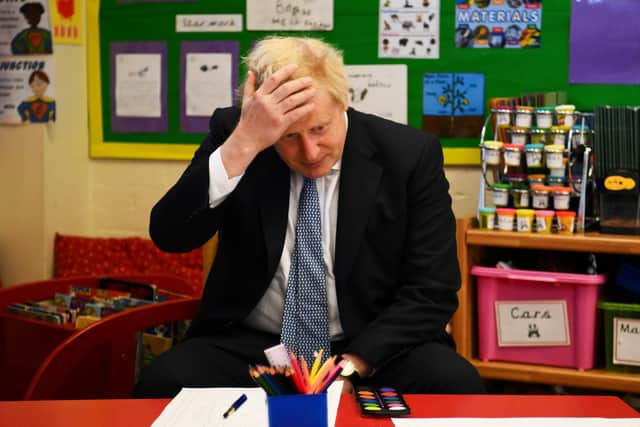Prime Minister Boris Johnson is heading for a cost of dithering crisis - Justine Greening
A clear sense of direction protects you from being buffeted by events and getting blown off course.
From my years spent as a Cabinet Minister running three different Government departments and time before that as a Treasury Minister, I know how crucial it is to provide your officials with direction as to where you want to go and how you want to get there.
Advertisement
Hide AdAdvertisement
Hide AdAny successful Government needs a plan from day one with a clear, overriding purpose of what it is trying to achieve.


And as we face a cost of living crisis, hitting families across our country, it’s never mattered more. Especially because Britain’s inflation crisis is more challenging than that facing other countries. According to analysts, our UK core inflation of six per cent in the year to March 2022 is already nearly twice the three per cent rate of our neighbouring Eurozone. That’s before we add on the food and energy price hikes all countries are facing as a result of Covid-disrupted supply chains restarting and the additional disruption from the war in Ukraine.
The Bank of England has difficult decisions to make on interest rates. But the Government must be decisive itself and recognise Britain has not just one but two cost of living related challenges to address.
Firstly, dealing with the challenge of global energy and food inflation that all countries are experiencing, it’s vital that Ministers use existing policy levers to deal with inflation. The Chancellor is right we cannot protect everyone, but surely he must urgently let these policy levers kick in by uprating welfare and pensions to maintain their purchasing value as intended and elsewhere increasing the warm homes discount to channel extra support to people for whom energy bills become increasingly unaffordable.
Advertisement
Hide AdAdvertisement
Hide AdWe must protect the most vulnerable in our society and those on fixed incomes.
Crucially, Ministers must also ambitiously address the second challenge driving Britain’s higher core inflation, which comes from a tight labour market due to skills shortages.
If we need any sort of emergency budget, it’s an emergency education and skills budget. Both for the short term, ramping up upskilling efforts significantly to connect people who want work to the opportunities going unfilled. And for the long-term upstream in the education system as well. The seeds of a future skills shortage were sown last year when the Government rejected the plan of Education Recovery Tsar, Sir Kevan Collins to tackle education gaps driven wider by Covid.
Our country’s skills shortages haven’t just happened overnight. Surely now is the time to strategically invest in early years and schools where the skills gap first begins to grow, developing our country’s talent pipeline for the long term. Today’s crisis underlies how it’s a false economy to do anything otherwise.
Advertisement
Hide AdAdvertisement
Hide AdThe lack of a plan in Whitehall damages consumer confidence and means contradictory messages for business. At this week’s CBI dinner, the Chancellor told businesses they must play their role by keeping on investing. Yet the recent rise in employer National Insurance and next year’s major Corporation Tax rise from 19 per cent to 25 per cent, sees Government making that harder, not easier.
Similarly on skills, the Chancellor urged businesses to do more. Yet its apprenticeship levy policy is so rigid that businesses who want to invest in skills often find it impossible. Latest figures showed billions of pounds of unspent levy had to be handed back to the Treasury when it could have instead been invested in skills development at a crucial time.
With no plan to guide them, Cabinet Ministers disagree with one another on the most basic question of the Government’s approach on tax and spend. Some favour a low tax, low spend Government, others press for a windfall tax on oil and gas companies. It must be bewildering for civil servants keeping up with piecemeal policy announcements that pull in opposite directions.
The good news is businesses and employers increasingly aren’t waiting any longer. They are rolling up their sleeves and getting on with solutions of their own, working with schools on providing mentoring and careers advice, offering work experience, changing their recruitment to reach the widest possible talent pool, and removing the barriers to progression in their companies.
Advertisement
Hide AdAdvertisement
Hide AdOther businesses are looking at social mobility coldspot recruiting and how the shift to hybrid working, far from being a bad thing, can enable different people to find it easier to get into roles they can offer. For example, those with caring responsibilities that make five days in the office each week hard to do. Businesses are asking their supply chain companies to be part of their push on levelling up too. Or tracking socio-economic diversity of their employees to check their opportunities are really reaching the groups that can benefit from them the most.
This is all fantastic innovation by employers and it is steadily providing a rich evidence base of just how much we can achieve on the ground irrespective of the pace of Government thinking and lack of a joined up plan. If the Government had got on with a plan for skills and levelling up on day one in office for Boris Johnson, back in July 2019 with an aligned economic strategy, we would be nearly three years into delivering it by now.
It would have meant vital progress had been made before the current economic headwinds of this cost of living crisis hit. No plan has meant reacting to events, rather than shaping them. Government needs to pick up the pace and fast. It needs a plan. Otherwise we will all face a government cost of dithering crisis on top of a cost of living one.